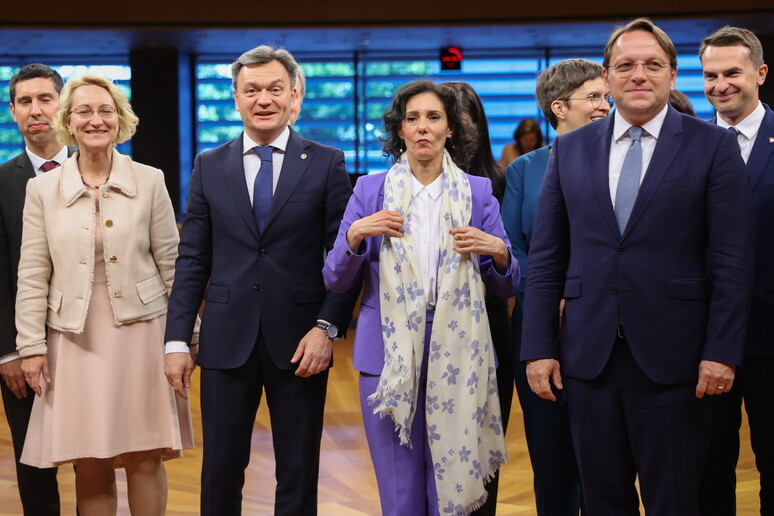War-torn Ukraine and neighbouring
Moldova are now officially in accession talks with the European
Union. Both countries were granted EU candidate status in 2022.
The landmark move has been hailed as historic and is the start
of a complex process that could take years.
On June 25, the European Union officially started accession
negotiations with Ukraine and Moldova - a move lauded by many
officials as a marker in the history of EU accessions.
Both countries have made rapid progress on structural reforms
mandatory to join the bloc over the last two years. In December,
EU government leaders had already stated the talks could start
if the two former Soviet republics did some additional homework.
The landmark move signals a vote of confidence in Kyiv's future
at a time when Moscow has momentum on the battlefield almost two
and a half years into Russia's invasion.
"This is a truly historical moment for my country," said the
Deputy Prime Minister of Ukraine, Olga Stefanishyna, who noted
that the start of talks gives Ukrainians "the moral power to
continue withstanding" Russia.
Moldova, a former Soviet republic, is holding presidential
elections in October. The country's pro-Western authorities
frequently accuse the Kremlin of interfering in its internal
affairs. Russia also has troops stationed in the breakaway
region of Transnistria.
While acknowledging and praising the progress made by both
countries, some pointed out that the opening of talks is the
symbolic start of the membership process. This process is likely
to take years - and may never lead to membership.
"The path ahead will be challenging," said European Commission
President Ursula von der Leyen. European Council President
Charles Michel pointed out that Ukraine and Moldova will have to
continue carrying out "substantial reforms" to comply with the
33 chapters that make up the accession process.
"It is the official start of a very complex and long process,"
according to Czech minister for European Affairs, Martin Dvořák,
recalling the 15-year-long accession talks of his country.
Russia's war in Ukraine has reinvigorated a push in the EU to
take on new members, after years in which countries' progress to
join has seemingly slowed down, particularly in the Western
Balkans.
The EU in December 2023 also granted candidate status to former
Soviet republic Georgia. In March, the bloc also approved the
conditional opening of accession negotiations with Bosnia and
Herzegovina and has talks ongoing with Serbia, Montenegro,
Albania and North Macedonia.
What happens after negotiations are opened?
The opening of the talks marks just the beginning: The accession
process now starts with an inventory of how far Ukraine and
Moldova have already come in regards to their legislation and an
assessment of which reforms of their democratic,
economic-financial, judicial and social systems are still needed
to align with EU requirements.
This stocktaking will take months. Then, step by step, different
'chapters' will be opened to gradually align fully with the EU's
requirements.
For Ukraine this process is strewn with political obstacles.
Standing in the way along that journey will be not just Russia's
efforts at destabilisation but reticence from doubters inside
the EU, most notably Hungary who will assume the six-month
rotating presidency of the Council of the European Union on July
1.
Budapest has been opposed to pressing ahead with Kyiv's
membership bid, arguing that Ukraine was unfairly moving ahead
for political reasons.
"From what I see here as we speak, they are very far from
meeting the accession criteria," Hungary's Europe minister János
Bóka said on Tuesday.
Accession negotiations can begin because Budapest lifted its
veto on the process which can only advance with the unanimity of
all member states. Hungary demanded that Ukraine respects the
rights of the Hungarian minority in the country and after
intense discussions this is now noted in the EU's negotiation
framework document.
Accepting Ukraine, a country of some 40 million people, would be
a major step for the EU, and there are calls for the bloc to
carry out reforms to streamline how it works before accepting
new members.
It is currently considered impossible for Ukraine to become a
member state prior to the end of the Russian war of aggression.
If Ukraine was a member, Kyiv could then call for military
assistance in accordance with Article 42, paragraph 7 of the EU
Treaty - and the EU would be a war party.
The negotiations also come at a tense time in Moldova after the
United States, Britain and Canada warned of a Russian "plot" to
influence the country's presidential elections in October.
President Maia Sandu has accused Moscow, which has troops
stationed in the breakaway Transnistria region of the country,
of aiming to destabilise Moldova ahead of the vote.
Belgian Foreign Minister Hadja Lahbib stated that the
relationship between the EU and Moldova was already bearing
fruit. The European Union is Moldova's largest trading partner,
which in turn offers important opportunities for business and
foreign investment.
Montenegro moving forward after seven years of virtual
standstill
Besides talks with Ukraine and Moldova, this week officials have
held their 16th meeting of the Accession Conference with
Montenegro to take stock of Podgorica's progress. This included
advances in reaching interim benchmarks regarding the rule of
law chapters.
EU Commissioner for Enlargement Olivér Várhelyi said that
Montenegro has "met the interim benchmarks in the rule of law
area" and can now move on to "start closing chapters".
The Balkan country obtained candidate status in 2010 and
accession negotiations began in 2012.
Montenegro's Prime Minister Milojko Spajić spoke of a "historic
moment" but also acknowledged that his country "had a long
period of drought". He further stated his country had achieved
results in the past seven months that were comparable to those
achieved over the last seven years and hopes for his country to
become a member state by 2028.
ALL RIGHTS RESERVED © Copyright ANSA











